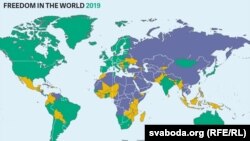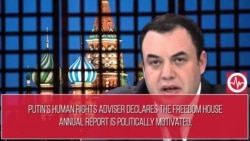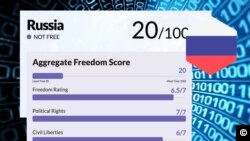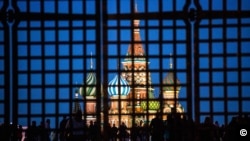Alexander Brod, member of the Russian president’s Council on Human Rights, seems to completely dismiss critical international reports about the state of civil and political rights in his country. Commenting February 5 on “Freedom in the World 2019,” the latest annual report by the U.S. non-governmental organization Freedom House, Brod said that “...these reports are politically motivated and used as an additional element of pressure on the country… they made a bogeyman out of Russia and constantly throw in negative information.”
Brod further suggested that international human rights organizations are in crisis, accusing them of acting selectively and in a politicized manner, and not being interested in assessing problems objectively or finding solutions.
Alexander Brod is not only a member of Russia’s presidential human right council. He is also the director of the Moscow Bureau for Human Rights, a non-governmental organization that is supposed to protect the rights of all Russian citizens and not be co-opted by the Kremlin.
Freedom House ranked Russia “Not Free” in its latest annual report on political rights and civil liberties around the world, giving Russia an aggregate freedom score of 20 on the 100-point scale used by Freedom in the World report. Surprisingly, Russia ranks lower than war-torn Afghanistan (27) and Iraq (32), and significantly lower than Kyrgyzstan – a small Central Asian nation, formerly part of the Soviet Union, which received a score of 38.
Among the factors that determined such low rating is Russia’s targeting of political dissidents abroad with practices such as harassment, extradition requests, kidnapping and even assassinations. Freedom House placed Russia among 24 countries around the world have targeted political dissidents. The attempted murder of Russian double agent Sergei Skripal and his daughter in Britain in March 2018 falls into that category, the most visible example of Moscow targeting political opponents overseas.
Russia’s occupation of Crimea continues to drag its Freedom House rating down, particularly the treatment of the Crimean Tatars and persons who identify as Ukrainian. Journalists and activists in Russia continue to work under perilous conditions, risking arrest, violence and even death for their independent reporting, “Freedom in the World 2019” states.
The report points to investigative journalist Maxim Borodin's suspicious death from a fall in April, one of a number of unexplained deaths Polygraph.info covered at the time.
Despite these gross violations of human rights, Russia is not the focus of this year’s “Freedom in the World” report: it is, in fact, the United States. Freedom House has dedicated a special chapter to the challenges to democracy in the U.S. and concerns raised by “Russian interference in U.S. elections, domestic attempts to manipulate the electoral system, executive and legislative dysfunction, conflicts of interest and lack of transparency, and pressure on judicial independence and the rule of law.”
Moreover, the report finds that a large share of countries in Central and Eastern Europe that made progress after the end of the Cold War were unable to maintain it, leading to an average 11 percent drop in their scores during the last 13 years of decline. Hungary and Serbia are prominently featured as examples of sharp decline in freedom: both were downgraded from “Free” to “Partly Free.”
Nevertheless, Freedom House ranked seven countries that emerged from behind the Iron Curtain some 30 years ago higher in aggregate freedom score than the United States. This is a sign that strong and sustained democratic development is possible in a relatively short period of time after decades of communist repression.
Russia is clearly not among those countries, and genuinely independent Russian human rights activists agree with this assessment.
But Alexander Brod, who dismissed the persecution of opponents and killings of journalists in Russia as “politically-motivated” accusations, pointed to other matters: “The Freedom House report also says nothing about the pressure on Russian journalists abroad, the decrease in Russian language teaching in the Baltic states, and the increase in the level of Russophobia in the world,” he said.
Russian complaints that Russian media are being mistreated abroad are not new. However, they usually concern state-owned and state-controlled outlets like Russia Today and Sputnik, which spread Kremlin disinformation in the West.
Brod also said that the Freedom House report does not include information about the Russian government’s support of non-profit organizations, the grants awarded by Russia’s Presidential Grants Foundation and social projects that assist thousands of socially vulnerable people.
Brod, however, failed to mention that among the Presidential Grants Foundation’s grantees is the notorious motorcycle gang, the Night Wolves, whose members have been involved in fighting in eastern Ukraine and propaganda operations throughout Central and Eastern Europe.
Furthermore, many of the presidential grantees are not genuine non-governmental organizations. Rather, they are established, controlled and financially backed by the government, and tend to engage in social, cultural and sports activities that do not oppose the regime. For example, in 2017, major grants were given to the Golden Mask theater festival ($826,600), the Russian Red Cross ($396,768) and the Sports Club of the Russian Communist Party ($252,940).
“We stand behind the findings in our report and welcome feedback where specific inaccuracies are alleged,” affirmed Vanessa Tucker, Freedom House’s vice president of research and analysis. “The methodology for our “Freedom in the World” reports has been developed over nearly 50 years and incorporates the analysis of more than 100 experts in order to ensure an unbiased assessment of political rights and civil liberties around the world.”










